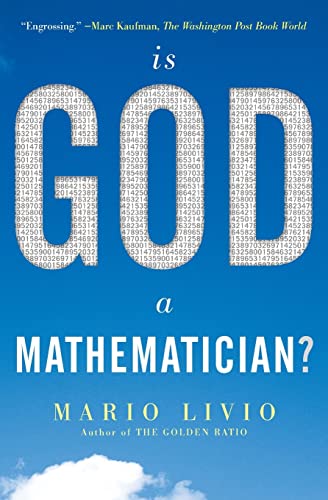Items related to Is God a Mathematician?

Synopsis
Bestselling author and astrophysicist Mario Livio examines the lives and theories of history’s greatest mathematicians to ask how—if mathematics is an abstract construction of the human mind—it can so perfectly explain the physical world.
Nobel Laureate Eugene Wigner once wondered about “the unreasonable effectiveness of mathematics” in the formulation of the laws of nature. Is God a Mathematician? investigates why mathematics is as powerful as it is. From ancient times to the present, scientists and philosophers have marveled at how such a seemingly abstract discipline could so perfectly explain the natural world. More than that—mathematics has often made predictions, for example, about subatomic particles or cosmic phenomena that were unknown at the time, but later were proven to be true. Is mathematics ultimately invented or discovered? If, as Einstein insisted, mathematics is “a product of human thought that is independent of experience,” how can it so accurately describe and even predict the world around us?
Physicist and author Mario Livio brilliantly explores mathematical ideas from Pythagoras to the present day as he shows us how intriguing questions and ingenious answers have led to ever deeper insights into our world. This fascinating book will interest anyone curious about the human mind, the scientific world, and the relationship between them.
"synopsis" may belong to another edition of this title.
About the Author
Mario Livio is an internationally known astrophysicist, a bestselling author, and a popular speaker who has appeared on The Daily Show, 60 Minutes, and NOVA. He is the author of the bestsellers The Golden Ratio, Brilliant Blunders, and Galileo. He lives in Baltimore, Maryland.
"About this title" may belong to another edition of this title.
FREE shipping within U.S.A.
Destination, rates & speedsSearch results for Is God a Mathematician?
Is God a Mathematician
Seller: SecondSale, Montgomery, IL, U.S.A.
Condition: Very Good. Item in very good condition! Textbooks may not include supplemental items i.e. CDs, access codes etc. Seller Inventory # 00087428351
Quantity: 2 available
Is God a Mathematician
Seller: SecondSale, Montgomery, IL, U.S.A.
Condition: Acceptable. Item in acceptable condition! Textbooks may not include supplemental items i.e. CDs, access codes etc. Seller Inventory # 00081538563
Quantity: 3 available
Is God a Mathematician
Seller: SecondSale, Montgomery, IL, U.S.A.
Condition: Good. Item in good condition. Textbooks may not include supplemental items i.e. CDs, access codes etc. Seller Inventory # 00083130606
Quantity: 8 available
Is God a Mathematician?
Seller: Zoom Books East, Glendale Heights, IL, U.S.A.
Condition: good. Book is in good condition and may include underlining highlighting and minimal wear. The book can also include "From the library of" labels. May not contain miscellaneous items toys, dvds, etc. . We offer 100% money back guarantee and 24 7 customer service. Seller Inventory # ZEV.0743294068.G
Quantity: 1 available
Is God a Mathematician?
Seller: Zoom Books Company, Lynden, WA, U.S.A.
Condition: good. Book is in good condition and may include underlining highlighting and minimal wear. The book can also include "From the library of" labels. May not contain miscellaneous items toys, dvds, etc. . We offer 100% money back guarantee and 24 7 customer service. Seller Inventory # ZBV.0743294068.G
Quantity: 3 available
Is God a Mathematician?
Seller: Goodwill of Colorado, COLORADO SPRINGS, CO, U.S.A.
Condition: Acceptable. This item is in overall acceptable condition. Covers and dust jackets are intact but may have heavy wear including creases, bends, edge wear, curled corners or minor tears as well as stickers or sticker-residue. Pages are intact but may have minor curls, bends or moderate to considerable highlighting/ writing. Binding is intact; however, spine may have heavy wear. Digital codes may not be included and have not been tested to be redeemable and/or active. A well-read copy overall. Please note that all items are donated goods and are in used condition. Orders shipped Monday through Friday! Your purchase helps put people to work and learn life skills to reach their full potential. Orders shipped Monday through Friday. Your purchase helps put people to work and learn life skills to reach their full potential. Thank you! Seller Inventory # 466SGT001ZSR
Quantity: 1 available
Is God a Mathematician?
Seller: Wonder Book, Frederick, MD, U.S.A.
Condition: Good. Good condition. A copy that has been read but remains intact. May contain markings such as bookplates, stamps, limited notes and highlighting, or a few light stains. Seller Inventory # D11B-03203
Quantity: 2 available
Is God a Mathematician?
Seller: Wonder Book, Frederick, MD, U.S.A.
Condition: Very Good. Very Good condition. A copy that may have a few cosmetic defects. May also contain light spine creasing or a few markings such as an owner's name, short gifter's inscription or light stamp. Seller Inventory # T09Q-00270
Quantity: 3 available
Is God a Mathematician?
Seller: Better World Books, Mishawaka, IN, U.S.A.
Condition: Very Good. Used book that is in excellent condition. May show signs of wear or have minor defects. Seller Inventory # 4315850-6
Quantity: 1 available
Is God a Mathematician?
Seller: Better World Books, Mishawaka, IN, U.S.A.
Condition: Good. Used book that is in clean, average condition without any missing pages. Seller Inventory # 3977375-6
Quantity: 5 available

